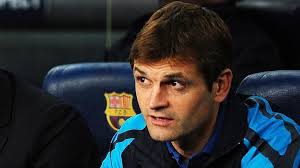Tito is No More[/b]
Former Barcelona manager and player Tito Vilanova lost his battle with throat cancer Friday at the age of 45.
 Tributes to Vilanova have been occuring all over Europe this weekend. German champions Bayern Munich wore black armbands and observed a moment of silence Saturday, and events all over Spain from La Liga matches to the Conde Godo tennis tournament in Barcelona have been honoring the fallen coach. Barcelona traveled to Villarreal to play Sunday, where a song was played in Vilanova’s honor before the match.
Tributes to Vilanova have been occuring all over Europe this weekend. German champions Bayern Munich wore black armbands and observed a moment of silence Saturday, and events all over Spain from La Liga matches to the Conde Godo tennis tournament in Barcelona have been honoring the fallen coach. Barcelona traveled to Villarreal to play Sunday, where a song was played in Vilanova’s honor before the match.
On the eve of Tito Vilanova's first season in charge of Barcelona, he stood in the middle of the Camp Nou pitch with a microphone in hand. Tradition dictates that the new campaign is welcomed with the Gamper Trophy and the manager always has a message to deliver. This time, in August 2012, it carried a special emotive power. I'm so happy that you're here with us, Vilanova turned to tell the French defender Eric Abidal. Your fight is our strength. Abidal had undergone a liver transplant in April of that year after suffering cancer and Vilanova knew something of what the Frenchman was going through: in November 2011 he had been diagnosed with cancer of the parotid gland in the throat while assistant manager to Pep Guardiola. The following May it was formally announced that he had fully overcome the illness and he looked forward to a future as the manager of the club. His[/i] club. Abidal was still recovering from the operation, his future uncertain.
When Guardiola won the coach's Ballon d'Or, he dedicated the award to Vilanova, delivering the most personal part of his speech in Catalan. Vilanova had by then been diagnosed with cancer but he returned to work in 18 days. My job is my whole life, he would say. And as Guardiola's time came to an end, he had overcome the illness and was given the chance to manage alone. In a television interview that winter, Vilanova explained how during treatment he had thought of his two children who still need me around. His son Adrià plays for Barcelona's juvenil[/i] youth team. A few days later, on what should have been a happy day, marked by Abidal's return, the news broke. He travelled to New York for treatment, temporarily leaving the post, returning to see Barcelona win the league title with a record 100 points.
On that December day when Barcelona announced Vilanova had suffered a relapse of the cancer to which he lost his life, the sporting director, Andoni Zubizarreta, was asked if Abidal and Vilanova's illnesses made Barcelona's legend even greater because they had overcame adversity. No, Zubizarreta replied, it makes us human.
Former Barcelona manager and player Tito Vilanova lost his battle with throat cancer Friday at the age of 45.

On the eve of Tito Vilanova's first season in charge of Barcelona, he stood in the middle of the Camp Nou pitch with a microphone in hand. Tradition dictates that the new campaign is welcomed with the Gamper Trophy and the manager always has a message to deliver. This time, in August 2012, it carried a special emotive power. I'm so happy that you're here with us, Vilanova turned to tell the French defender Eric Abidal. Your fight is our strength. Abidal had undergone a liver transplant in April of that year after suffering cancer and Vilanova knew something of what the Frenchman was going through: in November 2011 he had been diagnosed with cancer of the parotid gland in the throat while assistant manager to Pep Guardiola. The following May it was formally announced that he had fully overcome the illness and he looked forward to a future as the manager of the club. His[/i] club. Abidal was still recovering from the operation, his future uncertain.
When Guardiola won the coach's Ballon d'Or, he dedicated the award to Vilanova, delivering the most personal part of his speech in Catalan. Vilanova had by then been diagnosed with cancer but he returned to work in 18 days. My job is my whole life, he would say. And as Guardiola's time came to an end, he had overcome the illness and was given the chance to manage alone. In a television interview that winter, Vilanova explained how during treatment he had thought of his two children who still need me around. His son Adrià plays for Barcelona's juvenil[/i] youth team. A few days later, on what should have been a happy day, marked by Abidal's return, the news broke. He travelled to New York for treatment, temporarily leaving the post, returning to see Barcelona win the league title with a record 100 points.
On that December day when Barcelona announced Vilanova had suffered a relapse of the cancer to which he lost his life, the sporting director, Andoni Zubizarreta, was asked if Abidal and Vilanova's illnesses made Barcelona's legend even greater because they had overcame adversity. No, Zubizarreta replied, it makes us human.
